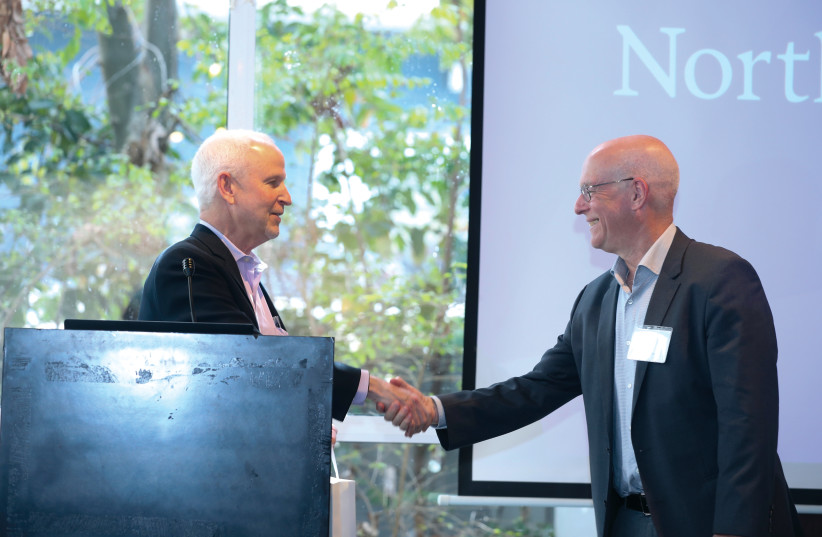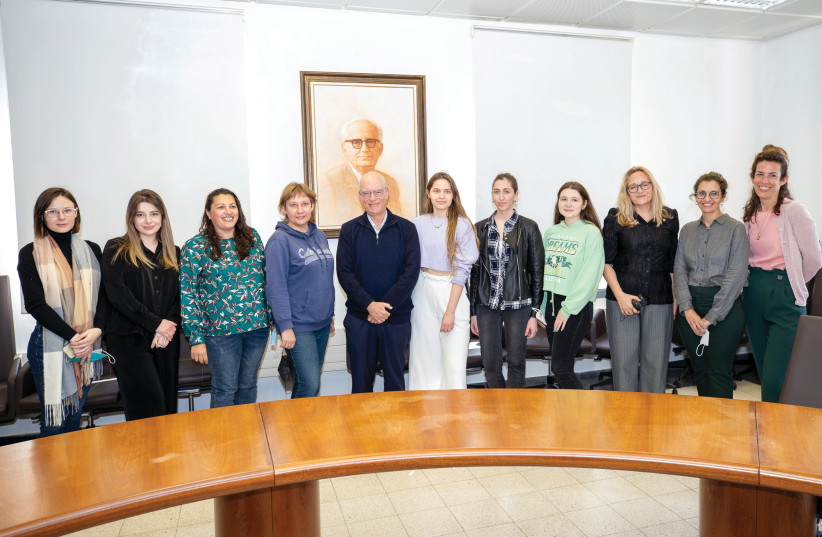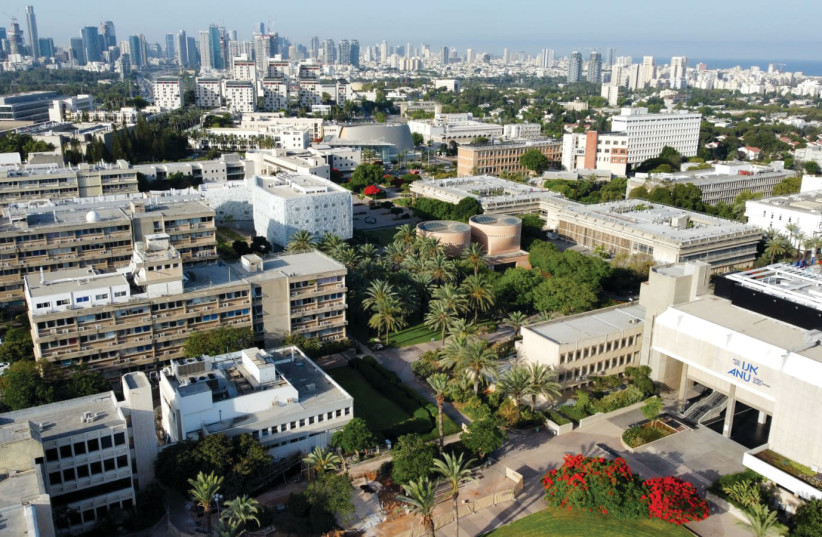The office of Ariel Porat, president of Tel Aviv University, tastefully furnished with comfortable black chairs, a gleaming brown conference table, a work desk and a computer, is expansive but not ostentatious. It is neat and orderly, with nary a stray book or paper in sight. Porat’s desk and conference table provide a vast, clean workspace for productive thinking and accomplishment.
In a sense, the physical space reflects its occupant. Porat himself is trim and fit, well-organized, and decidedly unpretentious. While most university presidents in the US would dress formally for a magazine interview, Porat wears an open-collared shirt and slacks. His only concession to formality occurs when the photographer arrives, and he briefly dons a suit jacket for a photograph. Porat is clearly uncomfortable wearing the jacket, and seems relieved to remove it for our interview.
Porat has served as a visiting professor of law at the University of Chicago and at the University of California at Berkeley, NYU, Stanford, the University of Virginia and other distinguished institutions throughout North America.
“At the University of Virginia,” he chuckles, “all of the lecturers wear a suit and tie. In Chicago, it is somewhat less formal, but everyone is well-dressed.”
Porat says that he is known for two distinguishing features: his casual dress, and eschewing the use of slide presentations in his lectures. “I try to avoid them,” he says. “I believe that when you speak to people, you should look them in the eye rather than become absorbed in a slide presentation.”

Throughout our 90-minute interview, Porat speaks precisely and directly, rarely referring to notes. He is clearly the master of his surroundings, where he has spent so much of his career.
Porat has been associated with TAU for 42 years. He began his studies at age 23 after completing his IDF service, earned his law degree in 1983, and received his research doctorate in law (JSD) in 1989. His parents were both judges: his father, Haim, served as vice president of Tel Aviv District Court, and his mother, Adina, was a judge at the National Labor Court.
“I absorbed law from an early age,” says Porat. “It seemed to me then, as now, an interesting profession.”
He did not plan on an academic career, expecting to become a lawyer. However, after spending a year at Yale as a visiting scholar, Porat changed course and entered the world of academia.
Porat joined TAU as a faculty member in 1990, serving as dean of the law school from 2002 to 2006 and chairing the University Strategic Steering Committee from 2013 to 2014. “Over the years,” he says, “the university became a second home for me. It was always my first professional home, even when I was elsewhere.”
Porat was appointed the ninth president of TAU in 2019. “I enjoy research very much,” he says, “but it was important for me to try to make an impact in the world.”
Porat felt that he could make a more significant contribution to Israeli society as the head of a university than as an academic. “Perhaps it is not fashionable to say as much these days,” he notes, “but I am a Zionist, and I feel that through my work, I am contributing to Israeli society.”
In a wide-ranging discussion, Porat outlined his strategic goals and vision, discussed the responsibilities that institutions of higher learning have in society, and shared some of his most challenging and satisfying moments heading the university.
Since becoming president, Porat has focused on three primary strategic goals: the continued internationalization and globalization of the school, multidisciplinary studies among the different subjects of research, and strengthening the university’s ties with the biotech and hi-tech industries in Israel.
TAU hosts over 3,000 international students each year and offers programs of varying duration and degree levels for international students, including semester, summer, year abroad, and full-degree programs. Its newest international program, beginning in October, is a bachelor’s degree program – the first of its kind in Israel– combining management studies in an entrepreneurship track with the humanities and social sciences.
Porat adds that the university hosts guest professors from different institutions during the academic year. This year’s roster of visiting scholars includes academics from leading universities in the US such as Harvard, Stanford and Yale, and professors from China, Italy and Belgium.
The global nature of the school is further reflected in the various partnerships that it has forged with other institutions, notably Columbia University and Northwestern University. TAU recently began a joint BA program in conjunction with Columbia in the humanities with a minor in life sciences and entrepreneurship offered to Israelis and international students. Students spend two years in Israel at TAU and two years at Columbia, earning a dual degree from both institutions. TAU and Columbia will also be offering a joint MSc program in engineering, and will also be offering a multidisciplinary program on aging and longevity that will be partnered with a research hub in Dubai.
Northwestern University, its other major partner, offers a joint LL.M. degree program in Public Law in conjunction with TAU, in addition to the MBA program that is offered by the two schools. Porat says that the university will be increasing its cooperation with Northwestern in nanotechnology, social sciences and Israel studies.
Perhaps the timeliest international program currently offered by the school is its emergency program that brings Ukrainian students and researchers to TAU, where they can continue their research. TAU was the first Israeli school to establish a fund for Ukrainian academics almost immediately after the war broke out.
Today, says Porat, eligible Ukrainian students and researchers who apply and are accepted can spend six months studying and engaged in their research at TAU, with expenses covered by the university.

While its Ukrainian program is taking in students, TAU will be expanding to Europe with its first physical extension outside Israel in Firenze, Italy. Israeli students in the arts and humanities will study history and art at its Italian branch, and Italian students there will study in TAU’s cyber, Artificial Intelligence, and entrepreneurship programs. Porat adds that in the past year, the university has made additional connections with countries in the region, including Khalifa University in the United Arab Emirates and institutions in Morocco, Bahrain and Turkey.
Porat’s second goal is to increase multidisciplinary studies to improve knowledge.
“Artificial Intelligence and data science are an engine for all disciplines,” he says. In that vein, the school is pioneering the utilization of AI and data science in various disciplines, including psychology, biology and law, and in the coming year will be offering between 10 and 15 courses in these subjects.
One of the most fascinating areas of multidisciplinary studies that Porat cites is the school’s Center for Combating Pandemics, which promotes research to help Israel cope with crises that may result from future pandemics. The center includes researchers, students, and administrative staff from epidemiology, public health, biology, mathematics, computer sciences, physics, statistics, economics, and other departments. Porat notes that the center prepared papers for the Israeli government during the corona pandemic with various solutions and strategies, some of which were ultimately employed by the authorities.
While TAU is justly noted for its achievements in science and technology, Porat says that the study of the humanities at universities worldwide has declined. In order to increase the appreciation and understanding of the humanities, the university will be initiating a program in which a selection of humanities courses will be offered to all students in STEM (science, technology, engineering and mathematics) programs at the school, as part of their regular degree requirements. By incorporating liberal arts courses into the science and technology curriculums, students will gain a greater appreciation of the humanities and their relevance, says Porat.
The third leg of Porat’s strategic plan rests on improving the university’s connections with the world of hi-tech, biotech and hospitals in Israel. The university will soon begin construction of a multi-story technology building that will house research and development teams of biotech and hi-tech start-ups that will work with the university. “We believe that physical proximity is beneficial for partnerships,” says Porat.
A second project that he cites, TAU Innovation Labs, will be bringing 10 innovation labs to the university campus. Asked if welcoming industry to the world of academia could present a potential conflict of interest between academia and narrow business interests, he says, “Such a conflict could occur, but the job of the university administration is to make sure that they do not occur.”
One hi-tech initiative that Porat is directing involves the creation of university research centers in hospitals in Israel. While universities have long had connections with hospitals for teaching and individual research, this proposal promises to have a more significant impact. Porat explains that the university centers will provide TAU researchers with a physical presence in the hospitals, which will enable better partnerships with doctors, and ensure a closer connection with patients, which will ultimately lead to more precise results sooner. In addition, he says, TAU researchers will analyze data from these centers, which can provide more accurate data for research.
As part of this program, TAU has opened a gene therapy center at the Sourasky Medical Center, and will be establishing additional digital medicine and neuroscience centers there as well. Plans are under way for additional centers at Sheba Medical Center in Ramat Gan and Beilinson Medical Center in Petah Tikvah.
One of the university’s most promising research centers is its Sagol Center for Regenerative Biotechnology, headed by Tal Dvir. Recently, researchers at the center successfully engineered 3D human spinal cord tissue and implanted them in lab models with chronic paralysis. The results presented a success rate of approximately 80%, and researchers are preparing for the next stage of the study, which will focus on clinical trials in human patients. Researchers hope that in several years, these engineered tissues can be successfully implanted in paralyzed individuals, enabling them to stand and walk again.
While Porat is justifiably proud of the school’s educational programs, one of his primary responsibilities as president is to ensure that the school has the necessary funding and resources.

“If you ask me what keeps me up at night,” he confesses, “it is the economic challenge.” Porat apparently can rest easy for the moment, as the university is on track for a record-breaking year of fundraising, having raised more than $100 million in the past six months. He characteristically deflects the credit for this success, thanking the university’s friends and supporters.
When asked what part of his job is the most appealing, Porat unhesitatingly replies: “What gives me the most satisfaction is interacting with faculty members who tell me about their research.”
Porat makes a point of meeting with new faculty members each year to learn about their interests. Before the pandemic, he would invite nine different faculty members from various departments each week to lunch, and he plans to renew this practice soon.
In Porat’s view, it is essential for faculty members and students to be satisfied with the learning and teaching experience at TAU. The school recently began a new initiative to investigate the issues and difficulties that faculty members report about school bureaucracy, and is doing the same with students to measure their level of satisfaction. “We want to improve what we can. I very much believe in this. The school must be a pleasant workplace.”
As Israel’s largest university, TAU has a responsibility to Israeli society, says Porat, and he suggests that the school’s successes improve the quality of life in this country.
“The center of the Start-up Nation is Tel Aviv, and the center of Tel Aviv is Tel Aviv University,” he says. “The research that is conducted here and the teaching of our students is how we influence the country.”
Porat adds that a university must communicate moral values to society by virtue of its conduct: tolerance, pluralism and liberal ideals. “I attach a great deal of importance to these values in my conduct as the president of the university and how the university conducts itself.”
Porat is in the third year of his five-year term as president, and he is comfortable in his role. He stresses that the credit for the school’s successes is not due to him alone. “There are many people who do the work – the provost, the executive director, and the various assistants. I am just the conductor of the choir.”
Prof. Ariel Porat may be “just” the conductor, but he is keeping everything running harmoniously. ■
